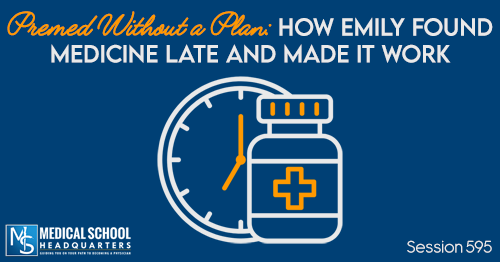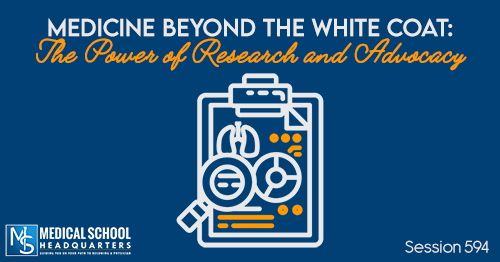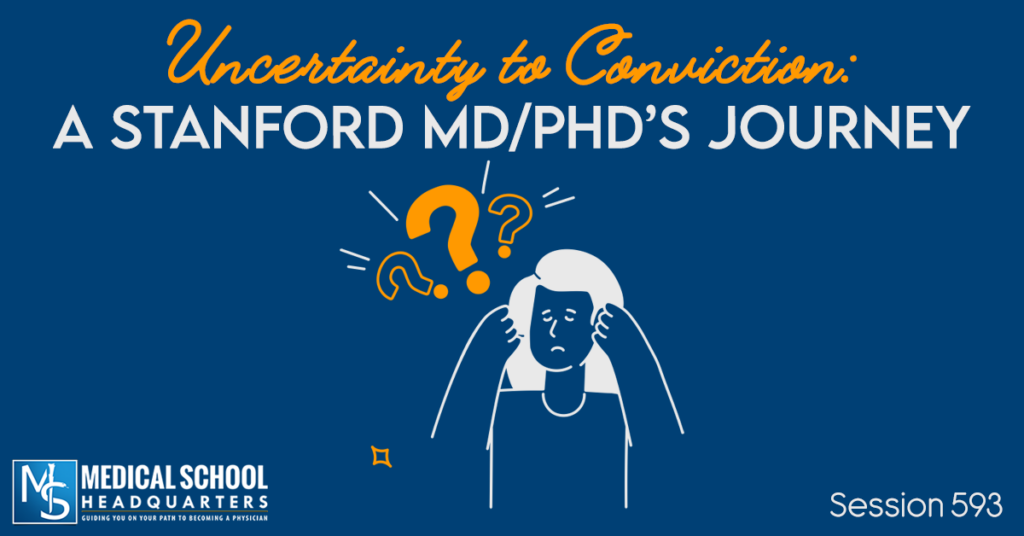Who are you?
I am a 22-year-old originally from Cumming, Georgia, a suburb just north of Atlanta. In high school, I played football and ran track. Football is part of what led me to Georgia Tech for my undergraduate education. At Georgia Tech, I walked on to the football team, played 4 seasons, and earned a scholarship my senior year. Currently, I am a 5th-year student in my last semester. I am not playing football this season due to the medical school application process.
While at Tech, my initial major was biomedical engineering. My grandfather and uncle are both veterinarians, I hoped this major would be an interesting and useful field of study for me as I worked towards applying to veterinary school. However, as I gained more exposure to clinical veterinary practice, I found that I liked working more with humans than animals. Because I also have an interest in cars and understanding how things work, I changed my major to mechanical engineering at the conclusion of my freshman year. Though I enjoyed working with people on complex, team-oriented problems during two engineering internships at General Electric, I missed the clinical environment of veterinary medicine. This led me to begin exploring a career as a physician.
Despite the fact that school, football, and other involvements consumed most of my time in college, I still have a variety of interests that I enjoy. On weekends, I can often be found completing my latest woodworking project, fixing up an old car, or attending a car show. Also, I love spending time outside and make my way to the mountains of North Georgia whenever I get a chance. Since my football career has ended, I have made the transition from an athlete focused on speed and strength development to one focused on endurance events. Two months ago, I completed my first marathon, and am planning on beginning training for an IRONMAN triathlon.
[Related Post: 5 Common Mistakes Premeds Make with Extracurriculars]
What did you major in?
Mechanical Engineering
[Related Post: Picking an Undergraduate Program]
Why do you want to be a physician?
I feel this question is best answered by the personal statement I wrote for my AMCAS application:
I carefully held the patient’s spleen as Dr. Biddle severed and ligated the last few blood vessels. When it finally came free, I lifted the spleen from the abdominal cavity and placed it in the steel pan to my right. While Dr. Biddle methodically sutured the incision, I looked back and forth between what he was doing and the cancerous organ I had just helped him remove, unsure which was more fascinating. After several minutes, he was done. We untied each leg binding the patient to the table and carried him back to his cage. I sat down and waited for him to regain consciousness before removing the endotracheal tube and sliding a cone-shaped hood over his head. My mind was racing; assisting with this Great Dane’s splenectomy was a pivotal experience on my journey towards pursuing a career as a medical doctor.
My interest in medicine began as a child while visiting my grandfather’s veterinary practice during summer breaks. When I was ten, he woke me up at 3 AM to ask if I would like to observe an emergency foreign body removal. Not sure what to expect, we made the drive down to Matthews Veterinary Hospital, and I watched as he removed multiple pennies from a dog’s stomach. Each time I came back to visit, I was eager to help in the clinic in whatever capacity I could. By the time I was 16, I started assisting with minor procedures.
Hoping that a technical understanding of living systems would serve me well in a medical career, I enrolled in the biomedical engineering program at Georgia Tech a few years later. During my second semester, I began working as a veterinary assistant at Dr. Biddle’s practice. Although the surgeries and procedures I assisted with were compelling, I left each ten-hour shift at the animal emergency hospital knowing something was missing. For the first time, I questioned my desire to attend veterinary school.
A few months later, while helping my roommate restore his 1967 Jeep, he suggested that I look into the mechanical engineering curriculum he was studying. My hobby of taking things apart and putting them back together and lifelong interest in cars subsequently led me to investigate the opportunities offered by the department. At the end of my freshman year, I changed my major to mechanical engineering.
Equipped with what I learned through a combination of classes and research, I jumped at the chance to complete two summer internships with General Electric, the world’s largest supplier of electricity. During my time as an intern, I valued working on projects that involved collaboration with motivated engineers and business leaders. My teammates and I made tangible changes to the power industry by exploring new technologies to ensure reliable operation of gas turbines, the main producers of electricity in cities and towns across the globe. At the end of these days, though, I felt the same way as when I left Dr. Biddle’s: something was missing.
It was time to determine the missing piece. Veterinary medicine founded my interest in medical procedures and techniques, but I felt this career was deficient in empathetic and meaningful relationships with patients. My internships helped me grow as a member of teams seeking to address complex problems, yet lacked the medicine I had felt so connected with over the years. I began to realize that working with humans in a clinical setting may provide the intersection of qualities I had only partly found in other professions.
My position as a volunteer medical assistant has been the last step in discovering the missing piece, and has cemented within me the only future I can now see for myself. While my responsibilities are similar to those as a veterinary assistant, I have found a unique purpose in serving humans. Each day, I arrive grateful for the chance to meet patients, gather vital signs, record chief complaints, and assist in the lab. These interactions allow me to learn about the individual experiences specific to each patient while simultaneously playing a meaningful role in his or her visit. From the construction worker who was forced out of work for weeks due to a knee injury, to the uninsured mother of three lacking the resources necessary to regulate her uncontrolled diabetes, I have found myself fulfilled and at home while working in a medical context with those of diverse backgrounds and lives.
As a medical scribe, I am honored to continue contributing to the field that combines my interests and skills with an environment in which I can make a positive impact on others’ lives. Ultimately, my experiences both within and external to healthcare affirm the last turn in my travels towards becoming a physician. One day, I would be honored to assist with or perform that splenectomy on a patient with two legs instead of four.
[Dr. Gray’s notes: If I were editing this personal statement, I’d have a lot of feedback on it. It reads a lot like a timeline and resume of what he’s done. If you want to avoid these mistakes, check out my book, The Premed Playbook: Guide to the Medical School Personal Statement.]
What was the most challenging part of being a premed student?
I particularly struggled with comparing myself to others, which often led me to consider questions such as:
- Do I have enough clinical experience?
- Does the fact I am majoring in mechanical engineering put me at a disadvantage?
- Is my research experience good enough, especially since I don’t have any publications?
- Will schools find it strange that my path to medicine was so circuitous?
For me, these constant doubts were what I found most challenging about being a premed student.
[Related Post: 10 Traits You Need to Succeed in Medical School]
Who did you lean on for support?
For the most part, I leaned on those closest to me for support. My girlfriend, sister, and roommates encouraged me throughout the MCAT and application process, for which I will always be thankful.
[Related Post: How to Protect Your Relationships as a PreMed/Med Student]
If you had a mentor, how did you find him/her?
I did not have one specific mentor, though I received advice from a number of individuals, including my pre-health advisor, my girlfriend (a current first-year medical student), and physicians that I’ve worked with.
What was the best general premed resource?
The Premed Years Podcast! I LOVE listening to the show every week, and I’m so thankful I found it at the beginning of this year’s application cycle. Even as an admitted student, I plan on continuing to listen to the podcast 🙂
[Related: Once you’re accepted, you can listen to Specialty Stories to help you find a specialty, or you can listen to Board Rounds which is starting in December 2018]
What was your relationship like with your school’s premed advisor (assuming you had one)
I met with my premed advisor three times and I felt that he was a great source of advice and encouragement!
What was your hardest class?
My hardest class was an engineering course called “Heat Transfer.” Though the volume of information was not excessive, the difficulty of the content far exceeded that which I saw in my other classes. Ultimately, I had to think of more creative ways to approach the problems and spent a great deal of time attempting to understand even the smallest, seemingly insignificant details.
[Related Post: Should I Take the C or Withdraw From My Class?]
What was your most impactful extracurricular?
My experiences as a Division I football player in the ACC were incredibly impactful. I learned the importance of discipline, time-management, working as a team player, and embracing the various roles I held over 4 years on the team. I believe these qualities are directly transferable to any profession, especially those in medicine.
Although I understand not every premed is interested in athletics, I would recommend that they all attempt to find a team-based, long-term activity to participate in!
[Related Post: Common Mistakes Premeds Make with Extracurriculars]
What would you change?
I would focus on my own journey rather than comparing myself to others!
How did you prepare for the MCAT?
I reviewed content using review books for a month and a half and then did practice questions/exams for a month and a half with continued content review.
Roughly how much did you spend on MCAT prep?
$50 for a used set of Kaplan books and $268 for the AAMC Complete Bundle.
[Related Post: MCAT Prep On Any Budget]
What were your top MCAT resources?
Kaplan review books and AAMC Complete Bundle.
What would you change about your MCAT prep?
I would have started 1 month earlier. Though I had a pretty good content foundation by the time I took the exam, I felt there were some things I could have known a little better.
[Need MCAT Prep? Save on tutoring, classes, and full-length practice tests by using promo code “MSHQ” for 10% off Next Step full-length practice tests or “MSHQTOC” for $50 off MCAT tutoring or the Next Step MCAT Course at Blueprint MCAT (formerly Next Step Test Prep)!]
How did you prepare for your applications?
I did no application preparation.
Roughly how much money did you spend on applications and interviews?
Too much! Perhaps around $3,500-$4,000.
[Related Tool: Medical School Applications Cost Estimator]
How did you choose what schools you applied to?
I created a list of schools that were located in places I could see myself living in and narrowed them down by mission, GPA, and MCAT.
How did you prepare for your interviews?
I did one mock interview with my pre-health advisor and one with a friend. Additionally, before each interview, I reviewed my AMCAS materials, secondary application, and referenced the research I had compiled on the school before applying.
Why do you think you were a successful applicant?
I believe that I did a good job of explaining how my experiences paved my path to applying to medical school. Additionally, I feel that my background (with college athletics and an engineering major) was relatively unique.
Dr. Gray’s Notes
This is a great story of someone who says he was unique, but who also says he struggled with comparing himself to others. This is a very common premed problem that I think leads to a lot of the competitiveness in the premed culture. You’re comparing yourself to others and then mistakenly think that because we’re comparing to them, that we’re also competing against them. It’s not true. You’re competing against yourself. Every day, you need to be better than you were yesterday. Focus on making yourself better and less on what your classmates are doing. There are plenty of seats in medical school for students who have good enough grades and good enough MCAT scores. You can do this!
Want to share your story?
If you’ve been accepted to medical school, or are a medical student, share your story with others to encourage, inform, and motivate them to continue down this path! Go here and fill out the form: https://medicalschoolhq.net/premed-success-story-submission/






